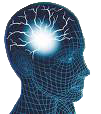Reported in Medscape. October 2015 (http://www.medscape.com/viewarticle/853421?src=wnl_edit_tpal&uac=233195CX)
Children and adolescents with migraine are more than three times as likely as those without headaches to have a mood disorder, such as depression, and almost three times more likely to have other neurologic conditions, such as epilepsy, a new American study shows.
The overlap between headache and mood disorders was particularly “striking” and highlights the need for neurologists to screen for such disorders, according to lead study author, Tara Lateef, MD, assistant professor, George Washington School of Medicine, who is also affiliated with Children’s National Health System, Washington, DC, and Pediatric Specialists of Virginia, Fairfax.
“Doctors should be doing a strong, thorough evaluation to assess for mood disorders,” said Dr Lateef. “These are young kids and if we are seeing that this migraine population is also at risk for having mental health problems, maybe we should be diagnosing this early. I don’t think anybody needs to be reminded of how severe the consequences are if we don’t treat mental illness in a timely fashion.”
Dr Lateef presented her research at the 44th Child Neurology Society (CNS) Annual Meeting.
The study sample included 9014 young people aged 8 to 21 years.
Overlapping Conditions
The study found that children with any headache, and specifically those with migraine, reported higher rates of other neurologic conditions. Epilepsy was “a big one,” said Dr Lateef, adding that the connection between headache and epilepsy could be causal — for example, seizure medications leading to headaches — or the two conditions could share a common cause.
Tic disorders were also relatively common among pediatric patients with headaches.
These overlaps are “not entirely surprising” given the “rich neuronal circuitry” in the developing brain, commented Dr Lateef.
Kids with headache had more developmental disorders, too. This includes the neurodevelopmental attention-deficit/hyperactivity disorder.
“When migraine kids do poorly in school, people are often quick to dismiss it, saying it’s probably because of the headaches,” said Dr Lateef. “But research shows that we should be screening these kids for attention-deficit/hyperactivity disorder because it could be an independent comorbidity*.” (*ie conditions that frequently present simultaneously in a patient & that may or may not linked in some way)
Children with migraine were also more than three times as likely to have a mood disorder and twice as likely to have anxiety compared with young nonmigraineurs.
This overlap was “unique to migraine,”. That raises the question of whether it’s an inflammatory pathophysiology for both.”
Another possibility is that both disorders are caused by certain neurotransmitters being elevated or diminished, she said. “But we still don’t know what makes a brain depressed.”
The overlap was “striking” to researchers because they were able to show it in such young children, who are a “pure population” in that they don’t have features that “cloud the issues,” said Dr Lateef.
She stressed that it’s not just psychiatrists who encounter patients with mood disorders and that neurologists and primary care doctors should also look for these conditions.
Richard Katesmark comments “ Firstly it is important to realise that just because a child or adolescent has migraine DOES NOT mean they are necessarily going to develop epilepsy or any of the other conditions mentioned above.
However the above research findings are no surprise to me. Anyone who has read some of my previous posts, or consulted me regarding their migraines and headaches, will know that I consider migraine a type of neurological ‘storm’ reflecting disregulated nerve function within the brain. It is not surprising that this disregulated neurological activity may result in sub optimal function in other areas of the brain controlling, for example, mood.
In the past it has been generally accepted that these coexisting conditions may be cause & effect, so migraine might cause people to be depressed/anxious, or that being depressed means you are more likely to experience headaches. Of course this is possible and in some cases maybe true. However increasing evidence is suggesting possible underlying common brain mechanisms that may result in multiple symptoms of neurological distress ; headpain, epilepsy, vertigo, mood disorders, chronic pain syndromes, etc etc.
The question remains whether these mechanisms are genetic, inflammatory, vascular, or as I’ve mentioned above, neurological. Most likely it is a combination of these factors, not to mention some currently undiscovered factors!”

